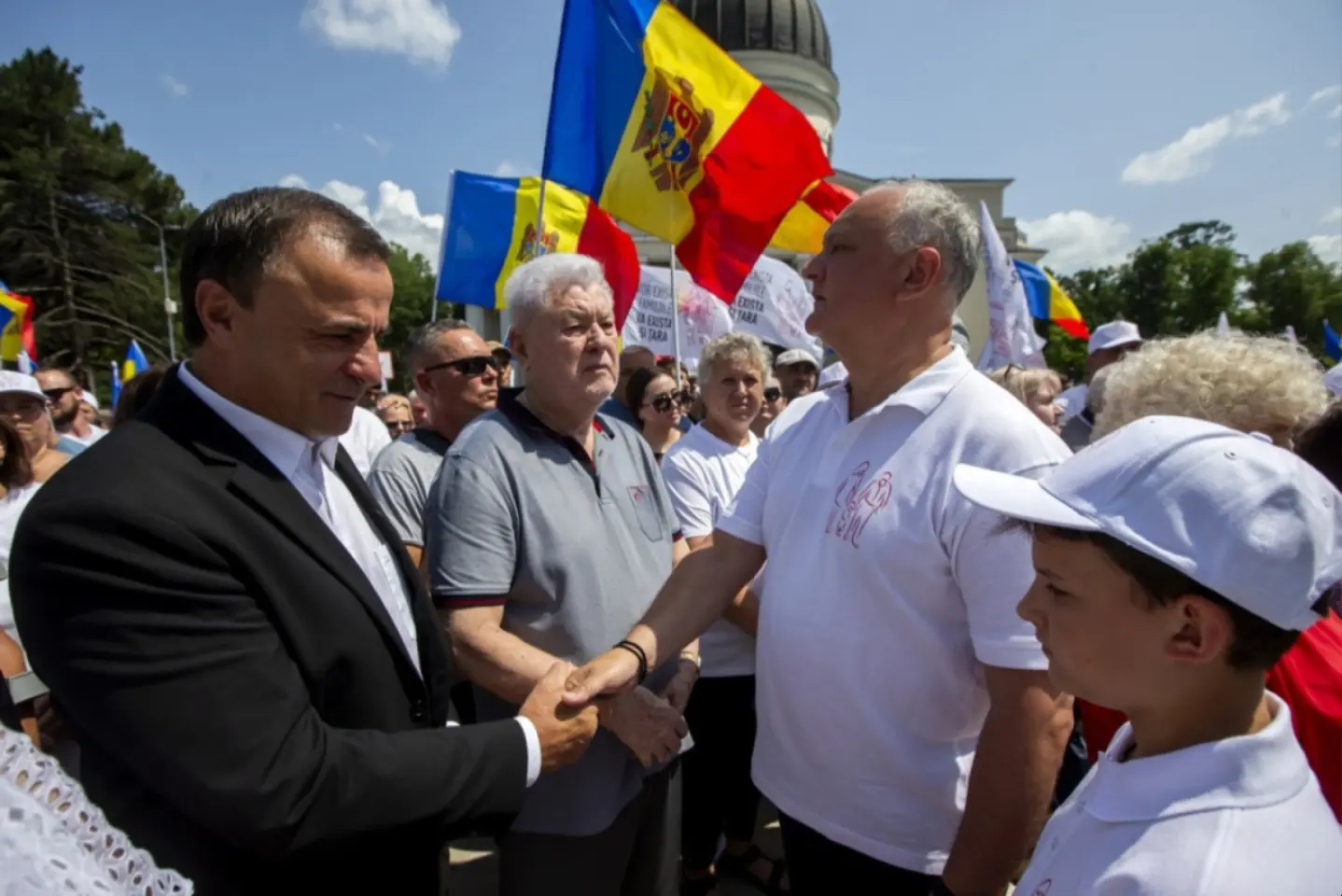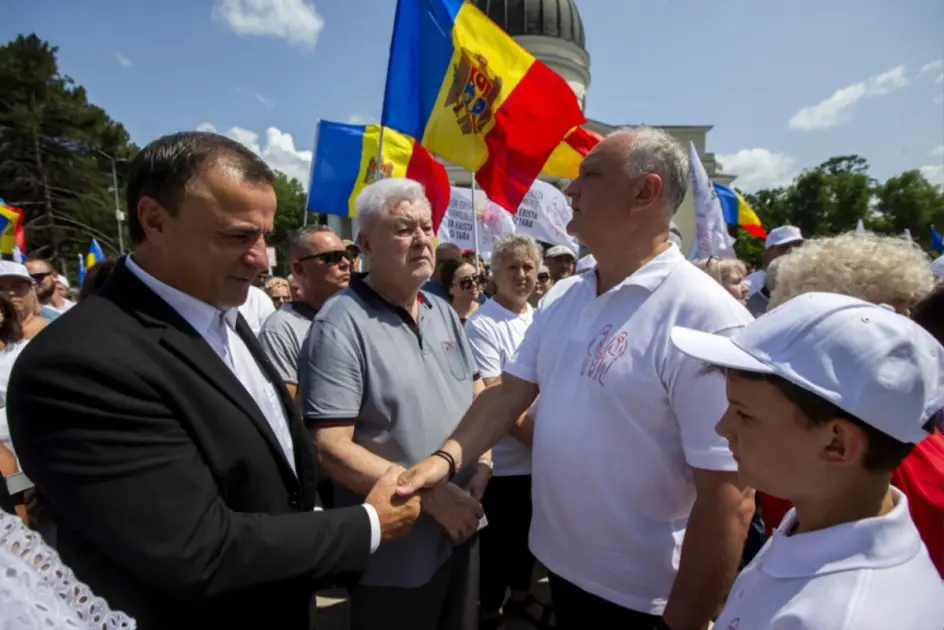
The parliamentary election period has started in the Republic of Moldova, and, once again, these elections are considered, like most elections in that country, to be “crucial” and “defining” for its future. As has been the case so often over the past decade and a half, the direction Moldova will take in the coming years is at stake: whether it will continue on its European path or return to Moscow’s orbit. Located in an area where Russian and Western interests clash, Moldova is the target of a hybrid war waged by Moscow, its society is divided, and a number of influential politicians are carrying out the Kremlin’s agenda.
The elections will take place less than a year after the last presidential elections and the constitutional referendum on European integration, which were won by the pro-Western camp, but with a “Pyrrhic victory,” given that less than 50.4% of participants voted in favor of European integration, with the difference between “YES” and “NO” being approximately 10,000 votes. As is the case now, the authorities at the time complained of brutal interference from Moscow through manipulation and disinformation campaigns, as well as massive vote buying – around 130 thousand votes , which was almost 10% of the total.
Russia wants to influence the outcome through disinformation and vote buying
Chisinau claims that Russia’s interference in the parliamentary elections is even more aggressive. “The Russian Federation wants to control the Republic of Moldova starting this fall and is preparing unprecedented interference in the September elections. The risks to public order and national security are high, and all institutions, as well as society as a whole, must be aware of the danger and protect ourselves from it,” Maia Sandu said on July 30 after a meeting of the Supreme Security Council , which discussed measures to combat information manipulation and foreign interference in the electoral process.
According to Maia Sandu, the Kremlin is investing in several political parties to get its people into the next parliament, with the aim of gaining control over power in the Republic of Moldova. The institutions in Chișinău claim to have identified 10 main instruments of interference in Moldova’s political and electoral processes and that financing of around 100 million euros is planned through cryptocurrencies alone. Moscow is considering information manipulation campaigns, paid protests, cyberattacks, the use of the Church, etc.
Shortly after the SSC meeting, the police announced that they were documenting a new form of electoral financing and corruption, managed from the Russian Federation through the #TAITO app. People are promised tens of thousands of Moldovan lei per month to participate in illegal actions, protests, and support for a particular candidate in the elections. The chat app is accessed on Telegram, and upon registration, people are asked to provide photos of their identity documents, phone number, and videos of their face for authentication.
Also for the campaign, Russia has activated a disinformation network called “Matryoshka”, which clones the websites of well-known international media organizations. The authorities in Chișinău have also noted that Russia is stepping up efforts to influence Moldovans living in Europe in an attempt to influence next month’s critical elections.
PAS loses popularity, while the opposition gains strength
The pro-European or right-wing camp in the Republic of Moldova is categorically dominated by the Action and Solidarity Party (PAS), set up by President Maia Sandu and ruling for the last four years, after getting a comfortable majority of 63 out of 101 seats. PAS has practically monopolized the political right, a first for Moldova, a country where the right has always been fragmented and has only been able to govern within coalitions. There are currently other right-wing parties that declare themselves pro-European, but polls show that they are practically non-existent in voting intentions.
However, PAS’s rating has eroded after four years in government—an extremely complicated period from an economic and security standpoint, marked by the war in Ukraine; in addition, mistakes have been made. The last three polls before the start of the election period show that PAS would win between 40 and 49 seats in parliament, which is insufficient to maintain its parliamentary majority.
On the other hand, the left and center of the political spectrum have managed to close ranks, creating two alliances. The first is the “Patriotic Electoral Bloc of Socialists, Communists, Heart and Future of Moldova,” which consists of four parties, led by the Socialists and headed by former President Igor Dodon. It also includes parties led by another former president, the Communist Vladimir Voronin, former prime minister during the Communist period (2001-2008) Vasile Tarlev, and former Bashkan (governor) of Gagauzia Irina Vlah. Both she and Igor Dodon were part of Voronin’s team. The bloc was created shortly after a visit by the leaders and representatives of the four parties to Russia , where they met with officials there, and several political commentators believe it was established at the behest of the Kremlin.
The second opposition alliance, the “Alternative” Bloc, emerged around Chisinau Mayor Ion Ceban. His party was joined by that of former Prime Minister Ion Chicu, as well as the party of Voronin’s former advisor, Mark Tkaciuk, and former Prosecutor General Alexandr Stoianoglo, who ran against Maia Sandu in the 2024 presidential election. The bloc declares itself pro-European and centrist, but its leaders are figures associated over time with the pro-Russian left in the Republic of Moldova. Veridica has recently written about the career and political discourse of Ion Ceban, who started out in Voronin’s team and was a staunch anti-European, only to present himself as a supporter of European integration in the run-up to the elections.
In fact, the pro-European discourse does not seem to have been convincing, as Ion Ceban has been banned from entering Romania and the entire Schengen area at the request of Bucharest. His bloc is more likely intended to attract the votes of more moderate pro-Europeans and those disappointed with PAS, and most experts in Chișinău believe that after the elections he will probably form a left-wing alliance.
The unknowns of the elections: the controversial Renato Usatii and Ilan Shor
Controversial politician Renato Usatii, leader of the political group Our Party, is also fighting on the same political battlefield. He claims to have made his money in Russia, doing business with the Russian Railways, but the press has written about Usatii’s links to Russian criminal groups , and there are photos of him by the side of a former leader of the Moldovan underworld, Grigori Caramalac (alias “the Bulgarian”). Elected twice as mayor of Bălți (the second largest city) and without completing either term, Usatii tried his luck several times in parliamentary elections, but without success. Instead, he came in third twice in the presidential elections. Usatii, who considers (or at least considered) Belarusian dictator Alexander Lukashenko his political role model, and in 2014 claimed that law enforcement should have acted more harshly during the Maidan in Ukraine, is also known for his statement that, if he comes to power, he will turn the US embassy into the largest karaoke bar in the country.
In fact, Usatii is a karaoke enthusiast and has sung several times alongside well-known artists, especially Russian ones, most recently this summer . Also, the politician has organized two concerts in Chisinau, for graduates, where he invited Russian artists who support the war in Ukraine. He managed to organize the concerts despite the fact that the authorities in Chișinău usually seek to prevent foreign citizens who have expressed support for Russia’s aggression from participating in events in the Republic of Moldova (for example, two years ago, a concert with Goran Bregovic’s band did not take place ). The behavior of the authorities and their subsequent stammering attempts to explain why this was possible could be a sign, according to some experts, that Usatii may be considered by PAS as a potential alliance partner in the future parliament.
Also on the left, parties affiliated with the fugitive oligarch Ilan Shor, who is based in Moscow and considered the Kremlin’s main string-puller in Moldovan politics, attempted to register the Victory Bloc to participate in the elections, but the Central Electoral Commission rejected the application, citing irregularities. Subsequently, restrictions were imposed on three of the four parties to participate in the campaign. However, the fourth party, the Revival Party, has submitted an application for registration, but no decision has yet been made. However, there are other parties that are allegedly affiliated with Shor. During the election campaign for the presidential elections on October 20, 2024, the Central Electoral Commission noted the “existence of a camouflaged electoral bloc” between the Revival Party, affiliated with Shor, and the Future of Moldova Party, which has now allied itself with the Socialists and the Communists. A journalistic investigation also revealed that Tarlev, who ran for president, was financially supported by Shor in the presidential elections.
Possible scenarios: from the preservation of the PAS majority to the pro-Russians coming to power
Therefore, the situation in Chișinău is quite complicated and unpredictable, and practically any scenario is possible. The first would be a new PAS majority, this time by a narrow margin, if we are to believe polls that give the party 49 seats without considering the diaspora, which is clearly pro-European.
Another scenario would be PAS with Ion Ceban’s party or Renato Usatii’s party, if they enter Parliament, but this would most likely be a short-lived alliance, and there would be no guarantee that the alliance partner would not block important decisions for the country’s European path.
The third would be an alliance between pro-Russian parties and the consequences thereof, especially since even Igor Dodon acknowledges that in such a case Moldovans would have to tighten their belts , as EU funding would no longer be available.

